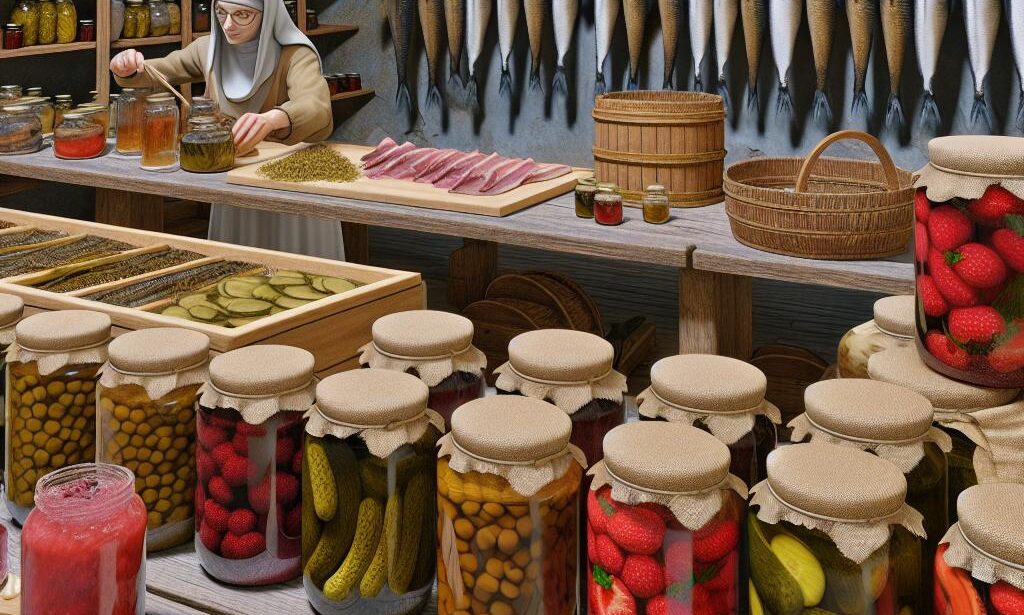Food preservation is a practice that has been utilized for centuries to extend the shelf life of perishable items and maintain their flavor. From ancient techniques such as drying and salting to modern methods like canning and freezing, the art of food preservation continues to play a crucial role in ensuring that our favorite foods remain fresh and delicious for longer periods of time. In this article, we will explore the various methods of food preservation and provide tips on how to effectively maintain the flavor of your favorite dishes.
Table of Contents
- Preserving Freshness: Understanding the Science of Food Spoilage
- Choosing the Right Preservation Method: Comparing Canning, Freezing, and Drying
- Tips for Maximizing Flavor: Proper Storage and Packaging Techniques
- Exploring Natural Preservatives: Using Salt, Sugar, and Vinegar to Enhance Taste
- Q&A
- In Retrospect

Preserving Freshness: Understanding the Science of Food Spoilage
Preserving the freshness of food is essential to maintaining its flavor and nutritional value. Understanding the science behind food spoilage can help us make informed decisions about how to properly store and preserve our food. By learning about the factors that contribute to food spoilage, we can take steps to prevent it and extend the shelf life of our favorite foods.
One of the main causes of food spoilage is the growth of bacteria, yeast, and mold. These microorganisms thrive in environments with moisture, warmth, and nutrients, which are all present in many types of food. By storing food properly in airtight containers, refrigerating perishable items, and using preservatives like salt and vinegar, we can inhibit the growth of these spoilage-causing microorganisms and keep our food fresh for longer.
Another factor that contributes to food spoilage is exposure to oxygen. Oxygen can cause oxidation, which leads to the breakdown of fats and proteins in food, resulting in off-flavors and odors. Vacuum sealing, using oxygen absorbers, and storing food in airtight containers can help prevent oxidation and preserve the quality of our food. By understanding the science of food spoilage and taking proactive measures to prevent it, we can enjoy fresh, flavorful food for longer periods of time.

Choosing the Right Preservation Method: Comparing Canning, Freezing, and Drying
When it comes to preserving food, there are several methods to choose from, each with its own benefits and drawbacks. Canning, freezing, and drying are three popular preservation techniques that can help you extend the shelf life of your favorite fruits, vegetables, and meats. Understanding the differences between these methods can help you choose the right one for your needs.
Canning: Canning involves sealing food in jars or cans and heating them to kill bacteria and other microorganisms. This method is great for preserving high-acid foods like fruits, pickles, and tomatoes. Canned foods can last for up to a year or more when stored properly.
Freezing: Freezing is a simple and convenient way to preserve food. By freezing food at low temperatures, you can slow down the growth of bacteria and enzymes that cause spoilage. This method is ideal for preserving meats, vegetables, and fruits. Frozen foods can last for several months to a year, depending on the type of food.
Tips for Maximizing Flavor: Proper Storage and Packaging Techniques
When it comes to preserving the flavor of your food, proper storage and packaging techniques are essential. By following these tips, you can ensure that your ingredients and dishes maintain their delicious taste for longer periods of time.
One key tip for maximizing flavor is to store ingredients in airtight containers. This helps to prevent exposure to air, which can cause food to spoil more quickly. Additionally, storing items in the refrigerator or freezer can help to extend their shelf life. Be sure to label containers with the date they were stored to keep track of freshness.
Another important technique is to use high-quality packaging materials. Investing in quality storage bags, containers, and wraps can make a big difference in preserving flavor. Vacuum sealing is also a great option for keeping food fresh longer. By taking these steps, you can enjoy the full flavor of your favorite dishes for longer periods of time.

Exploring Natural Preservatives: Using Salt, Sugar, and Vinegar to Enhance Taste
When it comes to preserving food, there are a variety of natural methods that can help enhance taste while extending the shelf life of your favorite dishes. Salt, sugar, and vinegar are three common ingredients that have been used for centuries to preserve food and add depth of flavor. By understanding how to properly use these natural preservatives, you can maintain the delicious taste of your meals for longer periods of time.
**Salt** is a versatile ingredient that not only enhances the flavor of food but also acts as a natural preservative by drawing out moisture and inhibiting the growth of bacteria. Whether you’re curing meats, pickling vegetables, or brining fish, salt can help preserve your ingredients while adding a savory kick to your dishes. **Sugar**, on the other hand, can be used to preserve fruits, jams, and even certain types of meats. Its ability to create a high osmotic environment makes it difficult for bacteria to survive, allowing your food to stay fresh and flavorful for longer.
**Vinegar** is another powerful natural preservative that can be used in a variety of ways to enhance taste and extend the shelf life of your favorite foods. Whether you’re making salad dressings, pickling vegetables, or marinating meats, vinegar’s acidic properties help inhibit the growth of harmful bacteria while adding a tangy flavor to your dishes. By incorporating salt, sugar, and vinegar into your cooking routine, you can master the art of food preservation and maintain the delicious taste of your meals for weeks to come.
Q&A
Q: What is food preservation?
A: Food preservation is the process of preventing food from spoiling or going bad, in order to extend its shelf life and maintain its flavor.
Q: Why is food preservation important?
A: Food preservation is important because it helps to reduce food waste, save money, and ensure that we have access to a variety of foods throughout the year.
Q: What are some common methods of food preservation?
A: Some common methods of food preservation include canning, freezing, drying, pickling, and fermenting.
Q: How does food preservation help maintain flavor?
A: Food preservation helps maintain flavor by slowing down the growth of bacteria and other microorganisms that can cause food to spoil. This allows the natural flavors of the food to be preserved for longer periods of time.
Q: What are some tips for preserving the flavor of food?
A: Some tips for preserving the flavor of food include using high-quality ingredients, following proper preservation techniques, storing food in airtight containers, and using appropriate seasonings and spices.
Q: How can I learn more about food preservation?
A: You can learn more about food preservation by taking classes, reading books and articles on the subject, and experimenting with different preservation methods in your own kitchen.
In Retrospect
In conclusion, mastering the art of food preservation is essential for maintaining the flavor and quality of your favorite foods. By utilizing various methods such as canning, freezing, and drying, you can ensure that your fruits, vegetables, and meats stay fresh and delicious for longer periods of time. Remember to always follow proper techniques and guidelines to ensure the safety and longevity of your preserved foods. With a little practice and patience, you can enjoy the flavors of your favorite seasonal produce all year round. Thank you for reading and happy preserving!

